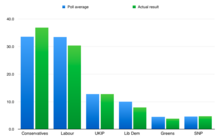| Opinion polling for UK general elections |
|---|
| 2005 election |
| Opinion polls |
| 2010 election |
| Opinion polls |
| 2015 election |
| Opinion polls • Leadership approval |
| 2017 election |
| Opinion polls • Leadership approval |
| 2019 election |
| Opinion polls • Leadership approval |

In the run up to the general election on 7 May 2015, various organisations carried out opinion polling to gauge voting intention. Results of such polls are displayed in this article. Most of the polling companies listed are members of the British Polling Council (BPC) and abide by its disclosure rules.
The date range for these opinion polls is from 6 May 2010 (the date of the previous general election) to 7 May 2015.
Most opinion polls cover only Great Britain (England, Scotland and Wales). Separate polls covering constituent countries of the UK and English regions are reported further below while polling of individual constituencies and groups of them (such as groups of marginals) is covered in a separate article.
In the event, the actual results proved to be rather different from those indicated by the opinion polls. Opinion polls conducted in the last few months of the campaign, and even in the last few days, had indicated a very close result between the Conservatives and Labour in terms of numbers of votes, suggesting that one of the main parties would have to form a perhaps complex coalition with smaller parties in order to govern.
However the actual results showed a stronger performance by the Conservatives, which gave them an overall majority, since Labour also had a weaker performance than the polls had suggested.[1][2][3] When the exit poll was initially presented, some commentators and politicians doubted it, with Paddy Ashdown even declaring "If this poll is correct I will publicly eat my hat on your programme" in response to the apparently poor results for the Liberal Democrats.[4] The exit poll was eventually proved to have in fact overestimated the Liberal Democrats' performance. If the Survation telephone poll (6 May) had been published it would have produced results within 1% of the election results.
- ^ Farmer, Ben (8 May 2015). "Why the opinion polls got it so wrong, YouGov president explains". The Telegraph. Archived from the original on 9 May 2015. Retrieved 8 May 2015.
- ^ Logue, Patrick. "UK Election: Ten key points from the count". The Irish Times. Archived from the original on 17 April 2023. Retrieved 8 May 2015.
- ^ Bennister, Mark (8 May 2015). "UK Election 2015: how the votes stacked up for David Cameron". The Conversation. Retrieved 8 May 2015.
- ^ Selby, Jenn (8 May 2015). "Paddy Ashdown's hat becomes the unlikely star of election night after the former Lib Dem leader's misguided prediction". The Independent. Archived from the original on 24 May 2022. Retrieved 8 May 2015.